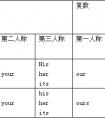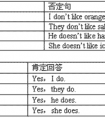用所给动词的正确时态填空。1.It takes about an hour _____(go) to Changzhou by bus.2.He left home without _____(tell) his mother.3.My sister seldom _____(play-七年级英语
What I hate most is being laughed at. 我最痛恨的就是被别人嘲笑。
(Being laughed at is what I hate most.)
四、动名词作定语
动名词作定语往往表示被修饰词的某种用途。如:
a walking stick =a stick for walking=a stick which is used for walking
a washing machine=a machine for washing=a machine which is used for washing
a reading room=a room for reading=a room which is used for reading
a measuring tape=a tape for measuring=a tape which is used for measuring
sleeping pills=pills for sleeping=pills which is used for sleeping
动名词也有时态和语态的变化,如表所示(以及物动词write为例),不及物动词没有语态的变化。
| 时态、语态 | 主动 | 被动 |
| 一般式 | writing | being written |
| 完成式 having written |
having been written |
1) 动名词做主语时,谓语动词为单数
2) 在动名词和不定式中,作为介词的宾语是动名词
3) 动名词的否定直接在其前加否定词,通过代词的宾格或所有格形式给出逻辑主语
例:I would appreciate you calling back this afternoon.
4) 有些词后只能接动名词
acknowledge;admit; advise;advocate;allow;appreciate; avoid; celebrate; consider; contemplate; defer; delay; deny;
detest; discontinue; dislike; dispute; enjoy; it entails; escape; excuse; explain; fancy; feel like; finish; forgive; can’t help;
hinder; imagine; it involves; keep; it means; mention; mind; miss; it necessitates; pardon; postpone; practice; prevent;
recall; report; resent; resist; risk; suggest; understand...
5) 另外还有一些接-ing形式的常用说法
it’s no good; it’s no/little/hardly any/ use; it’s not/hardly/scarcely use; it’s worthwhile; spend money/time; there’s no;
there’s no point in; there’s nothing worse than; what’s the use/point
6) 有些词后面加不定式和动名词均可
remember,forget,try,stop,go on,continue,stop,regret,cease,mean后面均可用不定式和-ing形式,但意义截然不容。
例:remember to do/doing:
①I remembered to post the letters.(指未来/过去未来将要做的动作)
②I remembered posting/having posted the letters.(我记得做过这个动作)
forget与remember的用法类似。
regret的用法:
①I regret to inform you that…(我很遗憾地通知你……)
②I regretted having left the firm after twenty years.(为了“二十年前的离开”而遗憾。)
try to(努力)与try +–ing(试验):
①You really must try to overcome your shyness.
②Try practicing five hours a day.
考点名称:现在进行时
- 现在进行时:
表示现在或当前一段时间正在进行的动作。可以表示有计划的未来,也就是用现在进行时表示将来。
现在进行时的构成是:
主语+be+v.ing〔现在分词〕形式
例如:He is writing on the desk. 现在进行时的构成:
主语+be+v.ing〔现在分词〕形式
第一人称单数I+am+ing.
第一人称复数We+are+ing.
第二人称单(复)数 You+are+ing
第三人称单数 He(She,it)+is+ing
第三人称复数 They+are+ing
肯定句:主语+be(is/am/are)+现在分词
否定句:主语+be(is/am/are)+not+现在分词
一般疑问句:be(is/am/are)+主语+现在分词
特殊疑问句:特殊疑问词+相应be动词+主语+现在分词+Sth?
间接引语中改为过去进行时。
变化规则:
1.直接+ ing(例:sleep+ing 变sleeping)
2.去掉不发音的e+ing(例:bite-e+ing 变biting)
3.重读闭音节,以辅音字母加元音字母加辅音字母结尾的词,要双写尾字母再加ing(例:swim+m+ing=swimming)
4.以ie结尾的重读闭音节,变ie为y+ing (例:die-dying lie-lying)
5结尾为c且c读作/k/时,在结尾加k再加ing,如picnic-picnicking现在进行时与一般现在时的区别:
(一)现在进行时表示动作的暂时性,而一般现在时表示动作的习惯性和经常性
I am watching TV now. (暂时性)
I watch TV every day. (经常性)
(二)现在进行时可表示短暂性动作,而一般现在时表示长久性动作。
Lucy is living in Beijing.(短时间居住)
Lucy lives in Beijing. (长久性居住)
(三)现在进行时表示的动作可带有感情色彩,而一般现在时所表述的动作通常是事实。
You’re always forgetting the most important things. (责备)
He is always helping others. (赞扬)
He often helps others. (事实)
(四)有些动词不能用进行时,know, understand, love, like, hate, wish, want, think, hope, have, believe, agree, hear, see, notice,等等。
这些动词通常用一般现在时表示说话时发生的动作。
I have a lot of friends here.
She wants to buy a new bike.
现在进行时用法注意:
1.进行时中,并不是所有的动词都要使用正在进行时。
例如一些表示状态和感觉的动词,一般不用进行时态,而是用现在一般时表示。
这些动词往往是等表示情感状态、知觉认识、愿望或短暂性的动词。
例如:see(明白),know, want, like, hear, have(有), think, hope, hate等。
I hear someone singing. 我正听见有人唱歌。
Do you see anyone over there? 你看到那里有什么人吗?
What does he think of it? 他觉得这怎么样?
如果这些词使用正在进行时态,句子带有某种感情色彩。例如:
Are you seeing someone off? 你在给谁送行吗?
They are hearing an English talk. 他们在听一个英语报告。
2.现在进行时还有另外一种含义,即它们能表达即将发生的事情,相当于一般将来时。
有些动词从结构来看是现在进行时,但却是表示将要发生的事,而不表示动作现在正在进行。
这些动词往往是一些表示位置移动变化的动词:arrive, come, do, get, go, have, leave, meet, play, return, see, spend, start, stay, wear, work等。
We are leaving on Friday。我们星期五出发。
Are you going anywhere tomorrow?你明天准备去哪儿?
A foreign guest is giving a lecture this afternoon。今天下午一个外国客人将给我们作报告。
Are you staying here till next week? 你打算在这里呆到下个星期吗?
在表示将来的情况下,特别是be going to do sth. 这种结构,已经没有多少“去”的意思了,几乎就是用来表达“将要、打算”做什么事情。例如:
It is going to be rather cold tomorrow。明天很可能非常冷。
She is not going to speak at the meeting。她不打算在那个会上发言。
3.当其与always、forever、continually、constantly 等副词连用时表示重复的动作,而这种动作可能使人不满,厌倦或满意。例如:
①She is perpetually interfering in my affairs.她老是干预我的事。 (不满)
②The students are making progress constantly.学生们在不断进步。 (满意)
4.在时间、条件状语从句中,有时可用现在进行时代替一般将来时。
When you are passing my way,please drop in.
你什么时候路过我家,请进来坐。- 现在进行时的用法:
A表示现在( 指说话人说话时) 正在发生的事情。
例:We are waiting for you.
B. 表示现阶段正在进行的动作,说话时未必正在进行。
例:Mr. Green is writing another novel.
(说话时并未在写,只处于写作的状态。)
例:She is learning piano under Mr. Smith.
C.已经确定或安排好的但不确定会不会发生的将来活动。
I'm leaving for a trek in Nepal next week.(我下周要去尼泊尔旅行)
We're flying to Paris tomorrow.(我们明天乘飞机去巴黎)现在进行时的应用
D .些非持续性动词的进行时可以表示动作即将进行或发生,或表示动作的重复。
例如:He is joining the army.
E.当现在进行时中有always, forever, constantly, continually修饰时,表示说话人的
赞赏或厌烦的情绪。
例如:They are always helping us.
注意:表示状态、感觉、心理活动的静态动词时,一般不使用进行时态。
F.子中有now时,常表示动作正在进行,这时要用现在进行时。如:
They are playing basketball now.现在他们正在打篮球。
- 最新内容
- 相关内容
- 网友推荐
- 图文推荐
| [家长教育] 孩子为什么会和父母感情疏离? (2019-07-14) |
| [教师分享] 给远方姐姐的一封信 (2018-11-07) |
| [教师分享] 伸缩门 (2018-11-07) |
| [教师分享] 回家乡 (2018-11-07) |
| [教师分享] 是风味也是人间 (2018-11-07) |
| [教师分享] 一句格言的启示 (2018-11-07) |
| [教师分享] 无规矩不成方圆 (2018-11-07) |
| [教师分享] 第十届全国教育名家论坛有感(二) (2018-11-07) |
| [教师分享] 贪玩的小狗 (2018-11-07) |
| [教师分享] 未命名文章 (2018-11-07) |


![Sunday is my birthday. I would like _____ a birthday party, would you _____to my party? [ ]A. have; come B. to have; to come C. have; to come D. to have-七年级英语](http://www.00-edu.com/d/file/ks/4/2/budingshi/2020-01-08/smalla85122db0c71d7fb6ae58187be7f1fd11578430330.png)

![Why areyou here? You are supposed ______ in the classroom now. [ ] A. to studyB. to be studiedC. studying D. to be studying -九年级英语](http://www.00-edu.com/d/file/ks/4/2/budingshi/2020-01-08/small6dee02daa62cac1c71853ac804ab4fbd1578422460.png)
![She is very poor. Little food _____ and no room _____! [ ]A. to eat, to live B. to eat, to live in C. eating, living -八年级英语](http://www.00-edu.com/d/file/ks/4/2/budingshi/2020-01-09/small17b77c2697a3ef8f1461d0d14b016ee51578585185.png)
